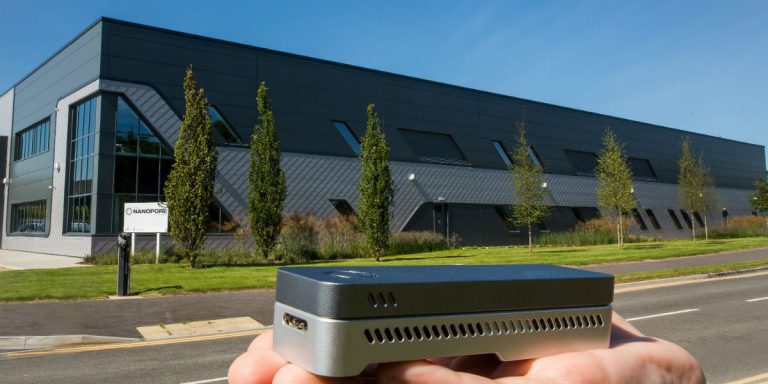
Oxford Nanopore Technologies is aiming to meet anticipated future demand for its pocket-sized MinION and other real-time DNA/RNA sequencers by starting to manufacture flow cells at a factory the company has opened in Oxford, UK.
The new 34,500-square-foot facility, which Oxford Nanopore calls the MinION building since it resembles the namesake sequencer, is designed to introduce high-volume, automated production processes to the manufacturing of consumable flow cells for Oxford Nanopore’s real-time DNA/RNA sequencing devices.
In addition to MinION, those sequencing devices include ultra-high throughput PromethION 48/24; the desktop GridION; and the Flongle, for rapid, smaller tests. The new plant is also expected to produce consumable flow cells for two devices Oxford Nanopore is now developing, the smartphone sequencer SmidgION, and Plongle, short for “plate Flongle,” designed for high sample number, small/rapid tests.
Oxford Naopore’s proprietary sequencing technology uses nanopores in combination with electronics to perform direct, real-time sequencing of DNA and RNA. The technology ranges in scale from pocket-sized to very high throughput benchtop devices, and according to the company can sequence very long fragments of DNA or RNA
The company said it plans to phase in full, end-to-end production over coming months, with the goal of satisfying anticipated future demand.
The factory, located within Harwell Campus, is designed to support a significantly increased production capability that is expected to exceed 1 million flow cells/year in four to five years. Oxford Nanopore is among more than 225 organizations, institutions, and businesses to operate from the 710-acre campus, located south of the historic city of Oxford.
“For years, we have been innovating production processes, to prepare for automation and scaling of our manufacturing processes. The build of the factory has been timed to support rapid growth in demand for nanopore sequencing technology,” Oxford Nanopore CEO Gordon Sanghera said in a statement.
Oxford Nanopore finished last year with $43.7 million, more than double the $17.8 million generated in 2017, the company tweeted. The company ranked No. 10 on Clinical OMICs’ list of Top 10 Sequencing Companies, published April 8.
Also more-than-doubling year-over-year was the volume of the company’s orders, which zoomed to $60.6 million from $24.5 million.
The company last year attracted an equity investment from Amgen of £50 million ($62.3 million), on top of a financing of £100 million ($124.6 million) completed in March 2018.











